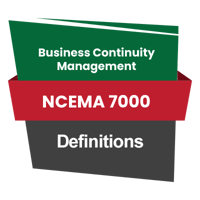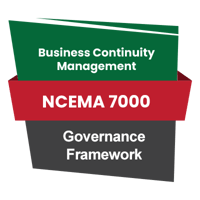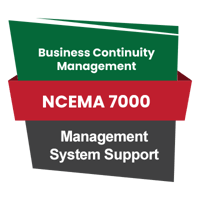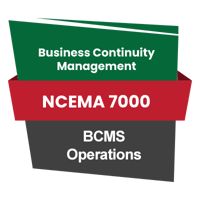Disclaimer
This eBook is intended for internal and educational purposes only for BCM Institute. The content is based on publicly available information and is not endorsed or authorised by UAE's National Emergency Crisis and Disaster Management Authority (NCEMA).
While every effort has been made to ensure accuracy, the information provided may need to be more comprehensive and up-to-date. It is not intended to be a substitute for professional advice.
Proper Usage of Guidebook
This guidebook is a value-added service from BCM Institute that provides participants implementing NCEMA 7000 with a contextualised version of its BCM implementation. It should only be used in conjunction with BCM Institute's training and not as a standalone. Its objective is to support BCM training and the visual training session provided by BCM Institute.
NCEMA 7000:2021: A Cornerstone for UAE Business Continuity
Introduction
NCEMA 7000:2021 is a comprehensive standard established by the UAE National Emergency Crisis and Disaster Management Authority (NCEMA). It has been developed as a national business continuity management (BCM) standard.
Its strength beside being a national BCM standard, is its alignment with becoming a BCM Systems (BCMS), which possesses the characteristics and strength of an ISO certification standard.

 NCEMA 7000 provides a framework for organisations to develop and implement robust BCMS.
NCEMA 7000 provides a framework for organisations to develop and implement robust BCMS.
This standard ensures businesses can continue their essential operations during and after disruptive events, such as natural disasters, cyberattacks, or supply chain disruptions.
Objective of "NCEMA 7000 Simplified"
 BCM Institute conducts the BCM-5000 ISO22301 BCMS Expert Implementer course for its global audience and is privileged to have attendees from the UAE.
BCM Institute conducts the BCM-5000 ISO22301 BCMS Expert Implementer course for its global audience and is privileged to have attendees from the UAE.
This book is for internal consumption to assist our UAE colleagues in contextualising the BCMS requirement taught during the course to the requirement as spelt out in NCEMA 7000.
The institute intends to ensure that the participants are grounded on their BCM knowledge and can apply the principles and content to its regulatory requirements.
Key Components of NCEMA 7000:2021
-
Scope: The standard applies to all organisations operating within the UAE, regardless of size or industry.
- Definitions: It clearly defines key terms related to BCM, such as disaster, crisis, and business continuity.
- Policy: Organisations are required to establish a clear policy that outlines their commitment to BCM and assigns responsibilities to relevant personnel.
- Planning: It involves identifying critical business functions (CBFs), assessing potential risks, and developing strategies to mitigate them.
- Implementation: Organizations must implement their BCM plans through training, testing, and maintenance.
- Review and Improvement: The BCMS should be regularly reviewed and updated to ensure its effectiveness and alignment with changing circumstances.
Benefits of Adopting NCEMA 7000
Enhanced Resilience: By following the standard, organizations can improve their ability to withstand and recover from disruptive events.
- Reduced Downtime: A well-implemented BCMS can minimise business interruptions and financial losses.
- Improved Reputation: Organisations that commit to BCM can enhance their reputation and trust with stakeholders.
- Regulatory Compliance: NCEMA 7000:2021 aligns with international best practices and may be required by certain regulatory bodies.
Certification and Implementation
Organisations can seek certification against NCEMA 7000:2021 through accredited certification bodies. This can validate their BCM system externally and demonstrate their commitment to resilience.
Implementing NCEMA 7000 requires a systematic approach involving a thorough risk assessment, comprehensive plan development, and ongoing maintenance. Organisations may benefit from seeking professional guidance to ensure successful implementation.
| Table of Content | Explanatory |
|
1 INTRODUCTION |
|
|
1.1 The Standard |
|
| 2 DEFINITIONS | |
| 3 GOVERNANCE FRAMEWORK | |
|
3.1 Top management |
|
|
4 CONTEXT OF THE ORGANIZATION |
|
|
4.1 Issues |
|
|
5 POLICY, SCOPE AND OBJECTIVES |
|
|
5.1 Business Continuity Policy |
|
|
6 MANAGEMENT SYSTEM SUPPORT |
|
|
6.1 People |
|
|
7 DOCUMENTED INFORMATION |
|
|
7.1 Creation of documented information |
|
|
8 BCMS OPERATIONS |
|
|
8.1 Planning and Control |
|
|
9 REVIEW AND EVALUATION |
|
|
9.1 Monitoring and Measuring Effectiveness |
|
|
10 CONTINUAL IMPROVEMENT |
|
|
10.1 Nonconformity |
|
 Summing Up...
Summing Up...
In conclusion, NCEMA 7000 is a vital tool for organisations operating in the UAE. It provides a framework for building resilience and ensuring business continuity in adversity. By adopting this standard, businesses can protect their operations, mitigate risks, and enhance their overall performance.
|
Business Continuity Management Series: UAE National Emergency Crisis and Disaster Management Authority (NCEMA) 7000 |
||||
 |
 |
 |
 |
 |
 |
 |
 |
 |
 |
More Information About Business Continuity Management Courses

 To learn more about the course and schedule, click the buttons below for the BCM-300 Business Continuity Management Implementer [B-3] course and the BCM-5000 Business Continuity Management Expert Implementer [B-5].
To learn more about the course and schedule, click the buttons below for the BCM-300 Business Continuity Management Implementer [B-3] course and the BCM-5000 Business Continuity Management Expert Implementer [B-5].
![Register [BL-B-3]*](https://no-cache.hubspot.com/cta/default/3893111/ac6cf073-4cdd-4541-91ed-889f731d5076.png) |
 |
 |
 |
 |
 |
![FAQ [BL-B-3]](https://no-cache.hubspot.com/cta/default/3893111/b3824ba1-7aa1-4eb6-bef8-94f57121c5ae.png) |
If you have any questions, click to contact us.
|
 |
 |
 |
 |


![Email to Sales Team [BCM Institute]](https://no-cache.hubspot.com/cta/default/3893111/3c53daeb-2836-4843-b0e0-645baee2ab9e.png)

